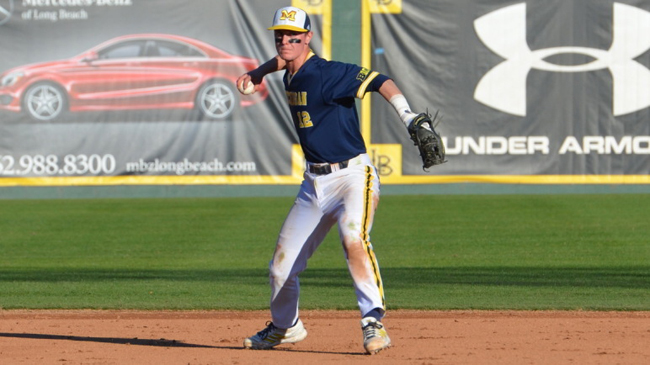
Eric Jacobson is a senior at Michigan’s Ross School of Business. He is also an Academic All-Big Ten Athlete and member of Michigan’s Leadership Council. Photo courtesy of Michigan Athletics
COLLABORATION BETWEEN SCHOOL AND ATHLETICS DEPARTMENT
You can care a whole lot about getting good grades and winning, but what about some experiences many employers are looking for? Like those important internships and studying abroad opportunities?
“All Carlson students study abroad,” Gundecha says. “For our athletes, it is a wonderful experience that many think wouldn’t be possible. It is sometimes a challenge, because how do they compete and stay in shape? We are very lucky to have an athletics department that works with Carlson.”
Gundecha says Carlson has a specific plan that works well with athletes. Instead of spending an entire semester abroad (although that is an option), student-athletes can do two-week programs that are typically in May or January. “The students have more ownership and there is more responsibility on their shoulders to work with the training staff ahead of time to see what they have to do to stay in shape,” Gundecha says.
Stecklein is an example of this. She will take a two-week trip to Australia in May to fulfill her international requirement. “The professors have all been super accommodating and flexible with my travel and now my coaches are being flexible with the academic requirement,” she says.
Internships are a little more difficult. They require the flexibility of a third Party—the company where the student athlete interns. “It really depends on the sport,” Carter says about Ross student athletes. “Most athletes want to work and do internships but their respective sport delineates their flexibility and availability. Some can be gone for the summer as long as they are back by August 15. Others, like football players, have to stay local. There are definitely a grouping of athletes that have to stay in Ann Arbor.”
Eric Jacobson is one of those athletes. Jacobson plays left field for Michigan’s baseball team and is a senior at Ross. He has spent the past two summers working for a small family-owned real estate development company in Ann Arbor. Jacobson was able to learn all about how to run and manage a small business while continuing his off-season training.
“It was a unique situation,” says Jacobson. “They had never had an intern before. I approached them and asked, what can I do? What value can I add to you guys this summer and still play baseball, workout and train? They were Michigan grads and gave me a schedule to work early in the morning and leave early afternoon so I could focus on baseball the rest of the day.”
A GAME OF GIVE-AND-TAKE
Kevin Bain, who is a diver and also a senior at Ross, says there is a clear give-and-take from both professors and coaches. “Since we do have such excellent academics, our coaches really know and emphasize education and the education side of being a student athlete,” Bain says. “I would say our coaches are flexible because they are very education focused. They make it work.”
Bain chose nearby Michigan over several Ivy League schools because of the facilities, coaches, and ability to excel as a business student and competitive diver. And regarding the difficulties of studying abroad and being an athlete? Bain’s sport allows him to do both.
“We are allowed to train anywhere,” Bain says. “Coach obviously wants us to be close to him but also understands we have passions outside of being an athlete. Every summer I have gone abroad. I’ve been to Germany and China working for a consulting firm. It’s hard to do being an athlete, but you can find ways to train. In China, I trained with the Beijing team seven days a week. But in Berlin, I did not get in the water.”
Alecia Kauss, a tennis player and direct admit to Indiana University’s Kelley School of Business, says the flexibility and accommodations of the program and professors are what impressed her from the moment she stepped on campus. “The professors really want the students to learn,” Kauss says. “They’re very accommodating and help with practice schedules and traveling. I immediately felt they had my best interest in mind.”











Questions about this article? Email us or leave a comment below.